Site of the Filming of the First Talking Feature Film
5800 Sunset Boulevard, Hollywood – map
Declared: 9/21/77
So the next time you’ve got folks in from out of town, drive by 5800 Sunset Boulevard and say, “This used to be Warner Bros back in the twenties. It’s where they filmed The Jazz Singer, the first feature with synchronized sound.” If you stop right there, they’ll be quite impressed. However, if you continue to show off with, “It’s also where they filmed Don Juan, the first feature film with a recorded musical accompaniment (via the Vitaphone process), and Lights of New York, the first all-talking feature,” your friends will roll their eyes and call you a nerd. Trust me on this one.
The Brothers Warner – Harry, Albert, Sam, and Jack – had been making movies in their downtown Los Angeles studio at 18th and Main when they bought ten acres of Hollywood land off Sunset and Bronson from the Beesmyer family. The cost? $25,000 at $1,000 per month, no money down.
In 1919, the studio built a giant stage on their new property. Nicknamed the Barn, it measured fifty-feet wide, 100-feet long, and had a roof supported by fifty trusses. Attached on two sides were shops, a pressing room, and offices. The first film made there was Speed, starring Al St John. Look! Here it is –
From the L.A. Public Library Photo Archive
The Warners tore down the barn in 1923 and built a collection of smaller stages and buildings in its place. In addition to The Jazz Singer, Don Juan, and Lights of New York, other movies filmed at the Hollywood property included Mammy, Svengali, and The Public Enemy. The biggest movie stars to emerge from Sunset and Bronson were John Barrymore and Rin Tin Tin.
From the L.A. Department of City Planning
In early 1925, Sam Warner started radio station KFWB on the lot. (An L.A. Times article from February of that year reported the 500-watt station was going to be called KWBC, with the WBC standing for Warner Brothers’ classics. Amuse your pals with that information.) You can see the station’s two 150-foot towers in the picture below. (You can also see a bit of the Hotel Iris before it became the Hotel Eldorado before it became the St Moritz Hotel.)
From the USC Digital Archive
Warner Bros bought a majority interest in First National Studios in 1928, consolidating its executive offices into that company’s 1926 Burbank lot after a $500,000 building program was completed in January 1930. Production followed over the hills shortly thereafter. While filming primarily occurred at the Burbank location, some shooting and phonograph recording continued at the Hollywood lot. (The fact the Sunset location became home in the 1930s to Termite Terrace, the animation production unit behind the Merrie Melodies and Looney Tunes cartoons, I guess makes Bugs Bunny and not Rin Tin Tin the biggest star to emerge from the WB Hollywood studio. Sorry, Rinny.)
From the L.A. Public Library Photo Archive
By the end of 1937, the Warner Bros had vacated their Hollywood home. A Warner brother-in-law, Rose Warner’s husband, Harry Charnas, however, stuck around, opening a 52-lane bowling alley behind the old executive offices. The Sunset Bowling Center was part of a “sports palace” that also contained badminton courts and a skating rink.
From the L.A. Public Library Photo Archive
Paramount bought the site in 1954 to provide television production facilities for KTLA, the first commercial TV station west of Chicago. The following year, the KTLA's general manager and the man who oversaw it’s start as experimental station W6XYZ back in 1941, Klaus Landsberg, announced some of the lot’s older buildings were being demolished to make way for the new facilities (it became the home of Matt Dillon and Gunsmoke). Paramount was also telling folks they were going to spend a million dollars on converting the old executive building into the new Motion Picture Exposition Building with proceeds to go to the Motion Picture Relief Fund. It was to house “a movie hall of fame, representing film favorites through the years, and display motion picture-making equipment, sets, wardrobes, live demonstrations and reproductions of set activity.” I reckon they got sidetracked.
KTLA moved to the studios in 1958. Gene Autry and his Golden West Broadcasters bought KTLA in 1964, leasing the space from Paramount until three years later when he bought the property for $5 million. In June 1968, radio station KMPC, of which Autry was a principal owner since 1952, also moved to the site (of course, KFWB was long gone at this point). (KMPC first broadcasted on February 19, 1927 with the call letters KRLO out of studios located at 218 Larchmont.)
In 1977, in conjunction with The Jazz Singer’s fiftieth anniversary, the city of L.A. declared the old Warner Brothers West Coast Studio Historic-Cultural Monument No. 180. At the time, the lot was filming Sha Na Na, What’s Happening, Carter Country, Sanford Arms, The Donny and Marie Show, Fernwood U.S.A., The Newlywed Game, The Liars’ Club, Hollywood Connection, and something called SZYSZNYK, starring Reggie Jackson, Debra Winger, and Ned Beatty.
Immediately behind the administration building.
The investment banking firm of Kohlberg, Kravis, Roberts, and Company bought the lot and KTLA from GWB in 1982. They turned around and sold out to the Tribune Company just three years later. In January of this year, Hudson Capital, which just paid $200 million for Sunset Gower Studios last August, bought the landmark 1920s Warner Bros Studio for $130 million.
I asked Marc Wanamaker, president of Hollywood Heritage and co-author of Early Hollywood, just what remains of the lot’s old Warner Bros days. He says there are many original buildings: the administration building; the original stages #1 and #2 (now stages #9A and #9B behind administration building – this double stage under one roof later became the bowling alley); the stages fronting Bronson Avenue (now stages 1, 2, 3, 4, 5); the rear block-long building (the old Termite Terrace and now the site of KTLA); the prop/special effects building (now production offices building #2); as well as the stage where some of the sound engineering for Don Juan and The Jazz Singer was filmed (it was one of the KTLA sound stages, located adjacent to the KTLA building toward the rear (south) part of the lot). Unfortunately, Marc adds some of these buildings are slated for demolition shortly. This may include the last mentioned, the most historic structure.
Marc also told me the current KTLA tower was one of the two KFWB towers that once stood in front of the administration building. Sometime in the late 1950s the west tower was removed and the east tower moved to the corner of Van Ness and Sunset.
Finally, here’s yet another picture of the old administration building, of classical design with that big colonnade of Doric columns. It saw expansions in 1929, the 1940s, and in 1965 (at least).
Sources:
“Warner Fuses Studio Offices” The Los Angeles Times; Nov 12, 1930, p. A1
“New Buildings Finished at Warner Brothers Lot” The Los Angeles Times; Jan 7, 1931, p. A7
“New Radio Station for Hollywood” The Los Angeles Times; Feb 12, 1925, p. A8
“Workmen Razing Home of Talkies” The Los Angeles Times; Mar 20, 1955, p. 25
“Hudson Capital To Buy Original Warner Studio for $130 Million” The Los Angeles Times; Jan 30, 2008
Up next: Burial Place of J.B. Lankershim
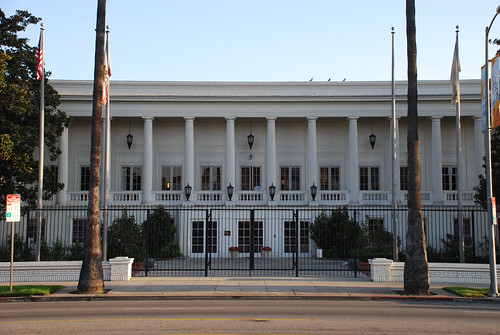
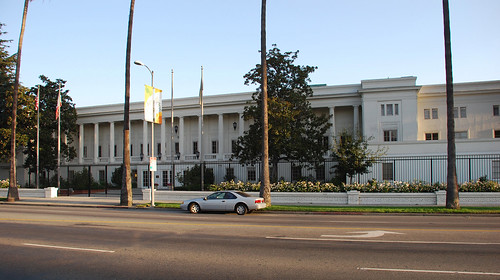
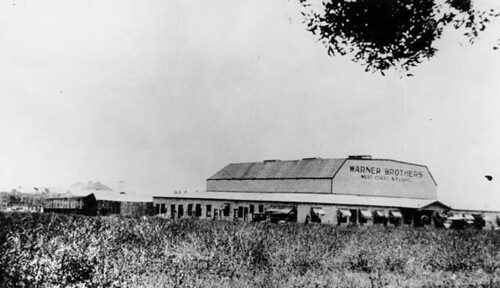
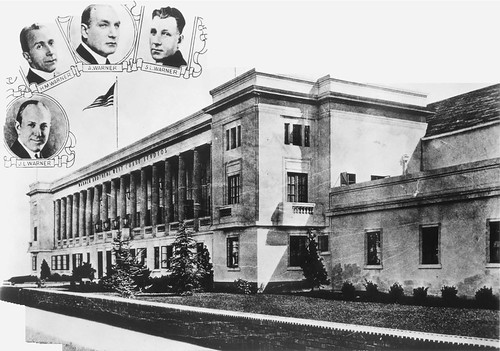
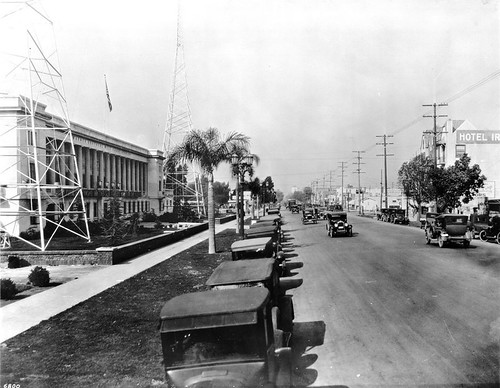
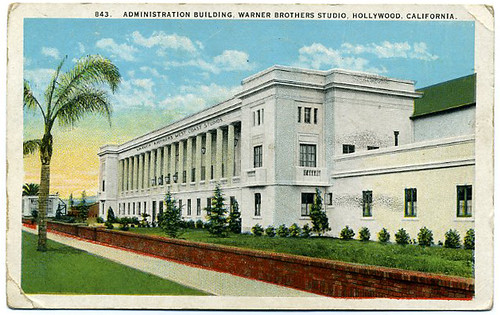
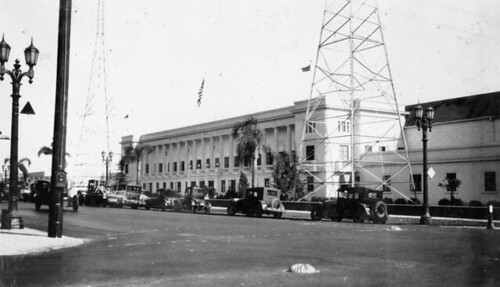
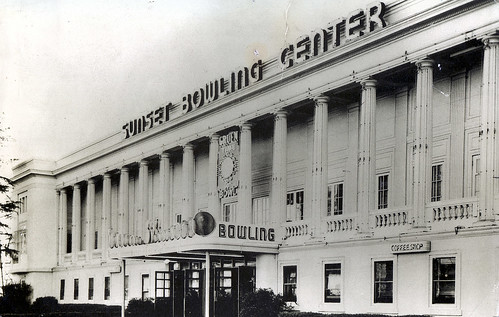
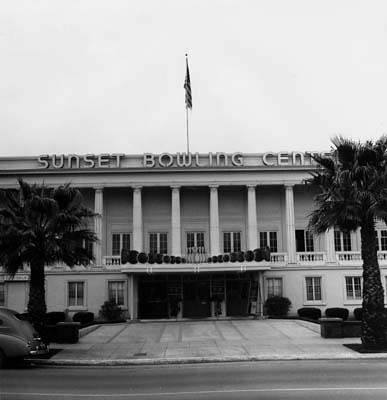
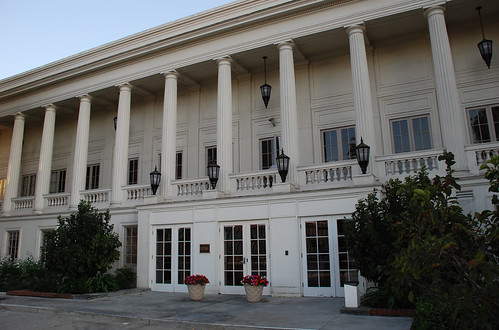
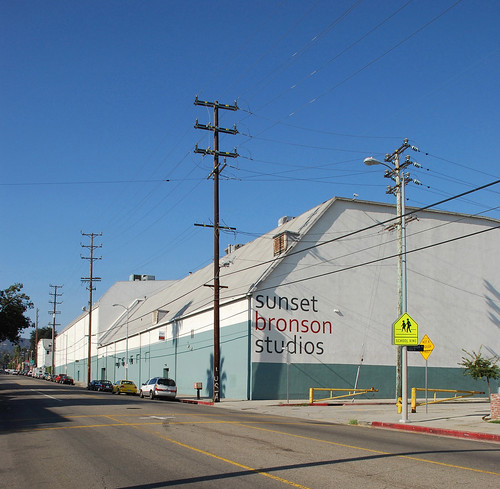
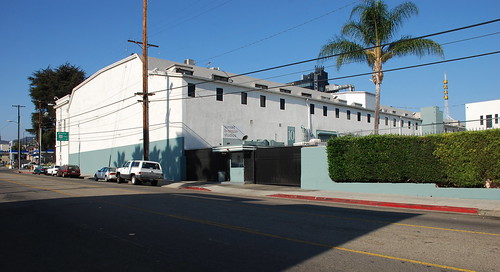
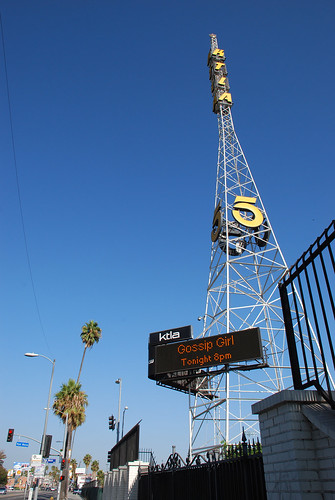
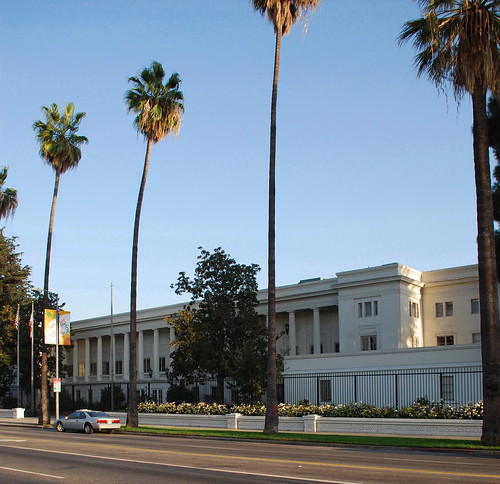
Wow so even back when they take something beautiful and turn it into something strange like a Bowling Alley.
ReplyDeleteInteresting.
Your research is quite impressive. Future generations will thank you!
ReplyDeleteThanks, gc. I'm not sure there will be future generations reading this blog. If there were, surely they'd now be commenting through the past somehow.
ReplyDeleteIt's somewhat ironic that the lot housed the WB Cartoon operation and years later KTLA was broadcasting (from this same location) those same WB cartoons with Skipper Frank and later Tom Hatten.
ReplyDeleteI always thought it was a library when driving by! I wanted to go in but always locked :/ They should have left it a bowling alley!
ReplyDeleteI grew up here in the 1970s. My father worked at KMPC during the night shift. Many times I wandered the dark hallways looking for ghosts.
ReplyDeleteFirst time I have seen this great history of the lot I worked on for 17 years. Seems I missed or you forgot to mention Stage 6 the site of many of the largest productions produced by the KTLA/GWB crews durning my stay there. I stage managed many of the shows you posted including Donny & Marie, Sha Na Na, Liars Club and even the short lived Szysznyk.
ReplyDeleteThank you so much,
Steve Dichter
I have a script from an Andrews Sisters Radio Show that gives the location of the broadcast a "Studio 3, Fernwood Ave (Warner Bros) Hollywood" Where would this have been and is the building still standing? Many Thanks - David Shelton
ReplyDelete